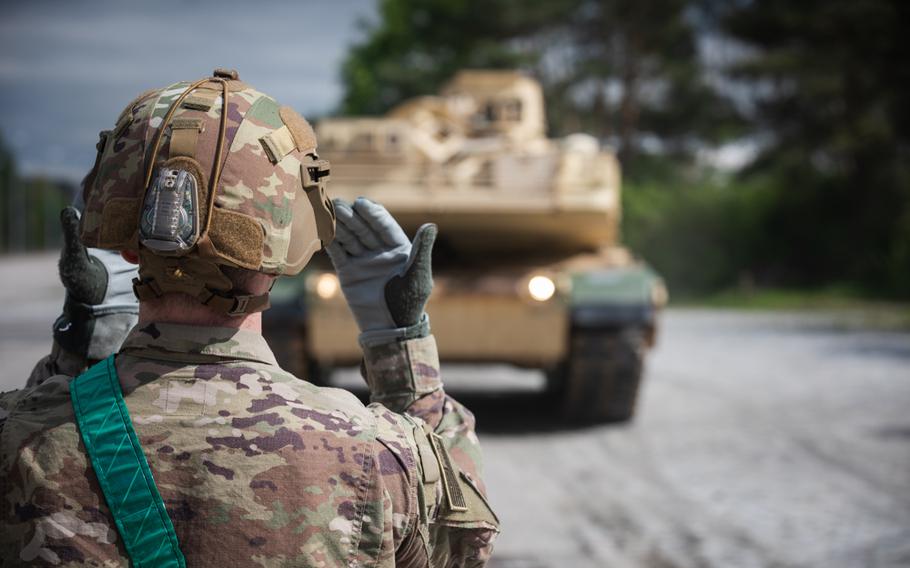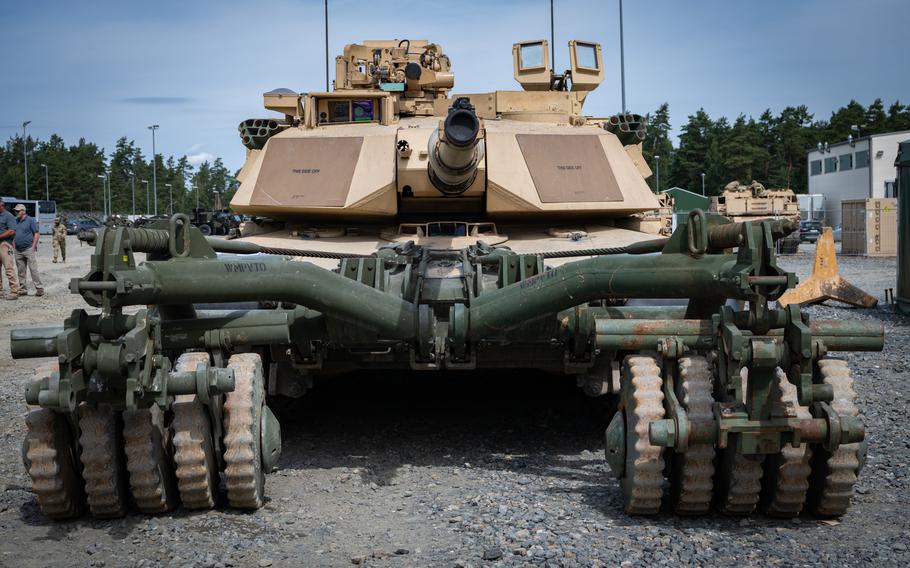
A U.S. soldier directs the delivery of M1A1 Abrams tanks used to train Ukrainian forces at Grafenwoehr, Germany, on May 12, 2023. The M1A1 training was expected to last 12 weeks but was recently extended. (Christopher Stewart/U.S. Army)
Hundreds of Ukrainian soldiers who have spent months in Germany learning to operate and maintain the most advanced U.S. battle tank are having their training extended at Kyiv’s request, the Army said Thursday.
A 12-week crash course designed to give the roughly 200 Ukrainians a good foundation on the tank and get them to the battlefield as soon as possible was due to end this week.
But the troops now will remain in Germany to receive previously unannounced “proficiency training,” which will last until a time closer to the arrival of the tanks in Ukraine, said Col. Martin O’Donnell, a spokesman for U.S. Army Europe and Africa.
The U.S. is set to deliver 31 refurbished M1A1 Abrams tanks to Ukraine this fall to help in the fight against invading Russian forces.
The additional instruction, which will take place at the Grafenwoehr Training Area in Bavaria, is not linked to the Ukrainian trainees’ performance, O’Donnell added.
Rather, he said, it’s designed to ensure that the skills that they’ve learned stay sharp in the interim.
Since May, American troops in Bavaria have been teaching their Ukrainian counterparts to use the platform, covering everything from basic marksmanship to battalion-level force-on-force tactics.

An M1A1 Abrams tank with an attached mine roller at Grafenwoehr Training Area, Germany, on July 14, 2023. Ukrainian soldiers will get extra training on the tanks in Germany, the U.S. military said Thursday. (Phillip Walter Wellman/Stars and Stripes)
Citing operational security, the U.S. has refused to provide details of the delivery to Ukraine, including a precise time frame.
President Joe Biden initially was unwilling to transfer Abrams tanks to Kyiv, with Pentagon officials saying the roughly $10 million platforms are too complex and expensive for the Ukrainians to operate, maintain and repair.
The Abrams runs on a jet turbine engine rather than a diesel engine. It burns through fuel at a rate of about 2 gallons per mile, meaning it requires a convoy of fuel trucks.
While an Abrams can power through most challenging terrain, fuel trucks sometimes can’t. That’s one reason many analysts believe the German-made Leopard 2 is a more suitable tank for Ukraine.
But German Chancellor Olaf Scholz insisted that he would allow Leopards to be sent to Ukraine only if the U.S. also agreed to send Abrams tanks.
Last month, U.S. personnel at Grafenwoehr downplayed the concerns about the tank’s complexity, saying the Ukrainians were being taught to take that into account.
An additional 200 soldiers already completed training on tank fueling operations and have returned to Ukraine, O’Donnell said. The proficiency training should help Kyiv’s forces reap even more benefits, he added.
“As the saying goes, practice makes perfect,” O’Donnell said.